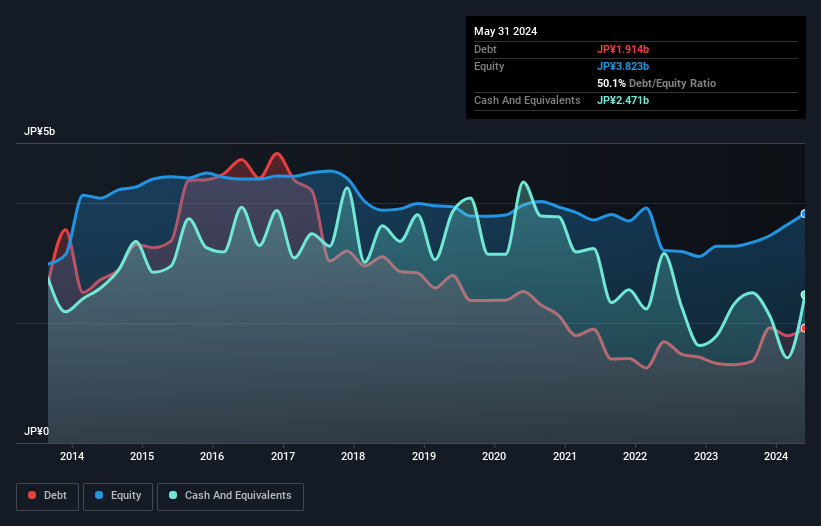
The external fund manager backed by Berkshire Hathaway's Charlie Munger, Li Lu, makes no bones about it when he says 'The biggest investment risk is not the volatility of prices, but whether you will suffer a permanent loss of capital.' When we think about how risky a company is, we always like to look at its use of debt, since debt overload can lead to ruin. Importantly, Interlife Holdings Co., Ltd. (TSE:1418) does carry debt. But the more important question is: how much risk is that debt creating?
When Is Debt A Problem?
Debt and other liabilities become risky for a business when it cannot easily fulfill those obligations, either with free cash flow or by raising capital at an attractive price. Ultimately, if the company can't fulfill its legal obligations to repay debt, shareholders could walk away with nothing. However, a more frequent (but still costly) occurrence is where a company must issue shares at bargain-basement prices, permanently diluting shareholders, just to shore up its balance sheet. Of course, plenty of companies use debt to fund growth, without any negative consequences. The first thing to do when considering how much debt a business uses is to look at its cash and debt together.
View our latest analysis for Interlife Holdings
What Is Interlife Holdings's Debt?
As you can see below, at the end of May 2024, Interlife Holdings had JP¥1.91b of debt, up from JP¥1.31b a year ago. Click the image for more detail. But on the other hand it also has JP¥2.47b in cash, leading to a JP¥557.0m net cash position.

How Strong Is Interlife Holdings' Balance Sheet?
The latest balance sheet data shows that Interlife Holdings had liabilities of JP¥3.35b due within a year, and liabilities of JP¥1.25b falling due after that. Offsetting these obligations, it had cash of JP¥2.47b as well as receivables valued at JP¥2.75b due within 12 months. So it can boast JP¥622.0m more liquid assets than total liabilities.
This surplus suggests that Interlife Holdings has a conservative balance sheet, and could probably eliminate its debt without much difficulty. Succinctly put, Interlife Holdings boasts net cash, so it's fair to say it does not have a heavy debt load!
Even more impressive was the fact that Interlife Holdings grew its EBIT by 476% over twelve months. That boost will make it even easier to pay down debt going forward. The balance sheet is clearly the area to focus on when you are analysing debt. But it is Interlife Holdings's earnings that will influence how the balance sheet holds up in the future. So if you're keen to discover more about its earnings, it might be worth checking out this graph of its long term earnings trend.
But our final consideration is also important, because a company cannot pay debt with paper profits; it needs cold hard cash. While Interlife Holdings has net cash on its balance sheet, it's still worth taking a look at its ability to convert earnings before interest and tax (EBIT) to free cash flow, to help us understand how quickly it is building (or eroding) that cash balance. Over the last three years, Interlife Holdings saw substantial negative free cash flow, in total. While investors are no doubt expecting a reversal of that situation in due course, it clearly does mean its use of debt is more risky.
Summing Up
While we empathize with investors who find debt concerning, you should keep in mind that Interlife Holdings has net cash of JP¥557.0m, as well as more liquid assets than liabilities. And we liked the look of last year's 476% year-on-year EBIT growth. So we are not troubled with Interlife Holdings's debt use. When analysing debt levels, the balance sheet is the obvious place to start. However, not all investment risk resides within the balance sheet - far from it. These risks can be hard to spot. Every company has them, and we've spotted 4 warning signs for Interlife Holdings (of which 1 is potentially serious!) you should know about.
When all is said and done, sometimes its easier to focus on companies that don't even need debt. Readers can access a list of growth stocks with zero net debt 100% free, right now.
New: AI Stock Screener & Alerts
Our new AI Stock Screener scans the market every day to uncover opportunities.
• Dividend Powerhouses (3%+ Yield)
• Undervalued Small Caps with Insider Buying
• High growth Tech and AI Companies
Or build your own from over 50 metrics.
Have feedback on this article? Concerned about the content? Get in touch with us directly. Alternatively, email editorial-team (at) simplywallst.com.
This article by Simply Wall St is general in nature. We provide commentary based on historical data and analyst forecasts only using an unbiased methodology and our articles are not intended to be financial advice. It does not constitute a recommendation to buy or sell any stock, and does not take account of your objectives, or your financial situation. We aim to bring you long-term focused analysis driven by fundamental data. Note that our analysis may not factor in the latest price-sensitive company announcements or qualitative material. Simply Wall St has no position in any stocks mentioned.
About TSE:1418
Interlife Holdings
Provides designs, constructs, manages, and maintains commercial facilities and public facilities in Japan.
Solid track record with excellent balance sheet and pays a dividend.
Market Insights
Community Narratives




